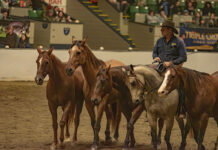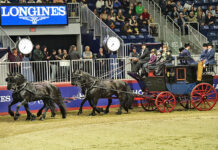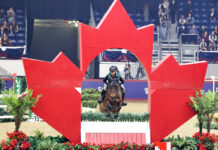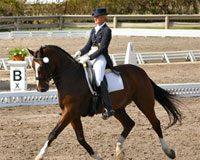 |
| Research suggests that horses don’t react to performing in front of an audience, but riders do. Photo: Leslie Potter |
Veteran competitors of the horse show circuit often have stories about horses who reacted strongly to being in the show ring. Some exhibitors say their horse thrives on the spotlight and lights up in competition. Others describe Jekyll-and-Hyde type transformations when their reliable partner becomes an uncontrollable beast once the judge is watching.
A recent study from the University of Vienna looked closely at horses and riders to see how they responded differently when working without spectators compared with performing in front of an audience. Researcher Marekike von Lewinski used the level of cortisol, a stress hormone, in the saliva and pulse readings to get an objective measurement of stress response.
The horses and riders in the study where from the classical dressage team of the French National Riding School, and the readings were taken after a rehearsal with no audience and after a performance with approximately 1,000 spectators in attendance.
Past research has shown that horses have stress responses when being ridden. Those symptoms were present in the horses in this research at roughly the same level regardless of whether an audience was present or not. Riders, however, reacted differently. The stress symptoms were significantly higher when the audience was present.
The researchers had predicted that even if the horses did not experience stage fright the way humans do, the stress levels in the horses would still be higher as their riders’ stress transferred to them. However, despite the conventional wisdom that a horse reflects his rider’s emotional state, this didn’t appear to be the case here.
The researchers do point out that their subjects were experienced horses and riders, and that results might be completely different in the case of green horses or novice riders.
Mareike von Lewinskia, Sophie Biaub, Regina Erberc, Natascha Illec, Jörg Aurichd, Jean-Michel Faureb, Erich Möstle, Christine Aurichc (2013). Cortisol release, heart rate and heart rate variability in the horse and its rider: Different responses to training and performance. The Veterinary Journal, dx.doi.org/10.1016/j.tvjl.2012.12.025






Sounds like the riders have show fright.
Sounds like a very closed study. I have one horse that just thrives on attention. Everyone, horse and human, is different!